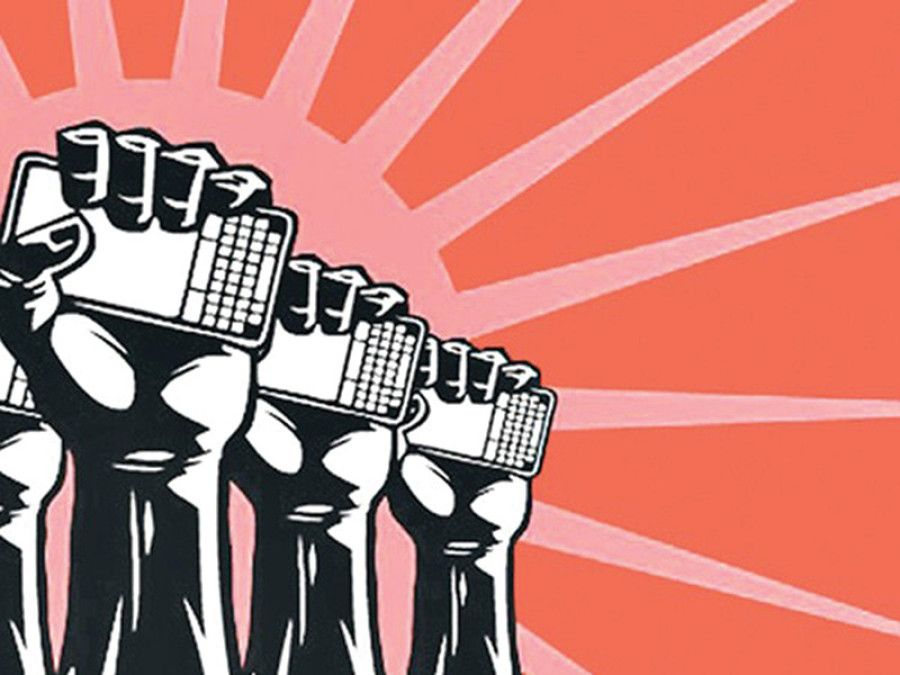Opinion
A better alternative force
It is a challenge for the new parties to reduce the perception that politics is a dirty game and to rekindle hope
Manavi Poudel
A political debate has been triggered after at least three alternative political forces geared up to challenge the political bastion of traditional parties. The debate was heightened after noted journalist Rabindra Mishra left his lucrative job to establish an alternative political force based on four pillars, namely system, transparency, integrity and excellence.
Several leaders and academicians in the past—Shree Bhadra Sharma, Keshav Sthapit, Devendra Raj Pandey and others—have made similar attempts. However, all of these political forces turned into non-starters due to dominant traditional forces, petty nepotism, and failure of political ideologies.
Tall promises
When Bibeksheel Nepali and Naya Shakti Party announced an alternative political and social movement in Nepal to flush out the political and social dirt that they saw for decades, a sense of enthusiasm and expectation abounded. But both have done little to bring change to the current political environment and to make an impression on the public.
Their inability to establish alternative and credible political forces could be attributed to weak political leadership, a dearth of political, social and economic agendas, and a lack of organisational skills. Mainstream and alternative forces in Nepal all share the attribute of producing impressive manifestos, which usually contain tall promises but nothing more.
Such tendency raises a few questions: Why do political parties repeatedly fail to address people’s grievances? Why is corruption ever present? And why has the country not made progress (even after over a decade since the end of the conflict)? Does the problem lie with the mainstream political parties? If they are indeed responsible for the nation’s problems, what option do we have other than creating alternative forces?
These questions should be considered by emerging forces, and permanent solutions should be presented and implemented. While we do not have a lack of parties, vision, or qualified leaders, we are failing to implement the vision, agenda and ideologies put forth. Lack of effective governance is the key reason for this failure. But it’s uncertain whether our parties have recognised this fact and are addressing it.
People need answers
Political vetting and scrutiny is prevalent in Nepal due to a high level of political awareness among the general populace. The champions of alternative forces have shown a tendency to attribute the sorry state of the nation to the ineptitude of traditional forces. Given the high level of political awareness in Nepal, people will undoubtedly have questions about the political, social and economic agendas of the new forces and their ability to implement them.
Major parties like the Nepali Congress, the CPN-UML, the CPN (Maoist Centre) and the Madhes-centric forces are well recognised by the people as having undergone much struggle and sacrifice in the past. They are also acknowledged for their political credentials. Their networks encompass people from almost all walks of life. Replacing these traditional networks with new forces is going to be a tall order, as many Nepalis are associated with politics in some form and may be reluctant to switch to new parties.
BP Koirala once said, “Economics is the management of goods, whereas politics is the management of people.” Politics is complex because people are complex. They have emotions, intelligence, inclination, and inhibitions on the one hand, and opinions, preferences and prejudices on the other. Managing all these attributes and aspirations without risking a rebellion is a Herculean task, because human beings are characteristically the most unpredictable and uncontrollable species on earth.
Noted political scientist David Easton defines politics as an “authoritative allocation of values”. These “values” are interests, needs, attitudes, preferences, choices, expectations, influences, promises, and deliveries that influence peoples’ behaviour and are “authoritatively allocated” by the political system, thereby rendering that act of “allocation” legitimate. But in modern times, this definition has been insufficient, as it does not incorporate the elements of unpredictability presented by such “authorities” and does not consider the unmanageability of the allocation mechanism.
Politics and dirty tricks
Nowadays, politics has largely lost its conventional appeal as the only legal and legitimate source of acquiring, managing and allocating values in society. We have been undergoing a protracted political instability, which has taken a toll on the lives of the people.
It is not wrong to say politics in Nepal has degenerated to dirty tricks of capturing and retaining power at any cost, with total disregard for people’s conscience and legitimate choice. It is a challenge for alternative forces to address such perception and rekindle hope.
These days, politics is hostage to the misdeeds of thugs who are bent on belittling the application of knowledge, wisdom and conscience in determining the course of action for the larger good of the country and its people. What can be done to rectify these problems? Can we afford to watch silently the continued nastiness of political actors or should we break our silence? We have been the victims of a vicious cycle of bad politics and governance, with the failure of over two dozen governments in the past six decades.
Criticising others is easy, but the champions of the new forces should address current grievances and formulate a concrete and actionable plan of execution. The youths, on their part, should start advocating against the status quo. They should either build their own networks of solidarity to fight current political structures, or support those who have already embarked on a mission to transform Nepal. Remaining in the middle ground is tantamount to rejecting change. The task the alternative forces have set before them is daunting, but we should hope for their success.
Poudel is a development practitioner




 9.89°C Kathmandu
9.89°C Kathmandu










